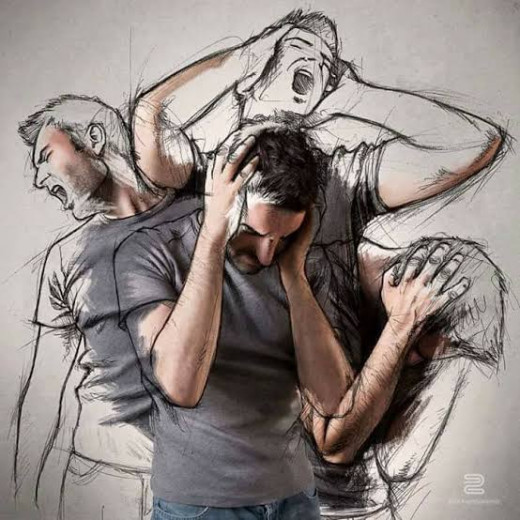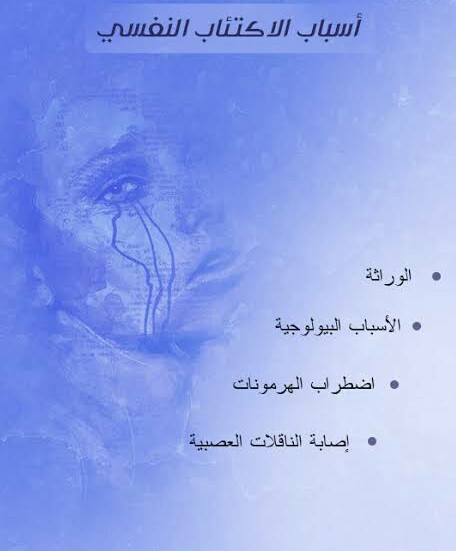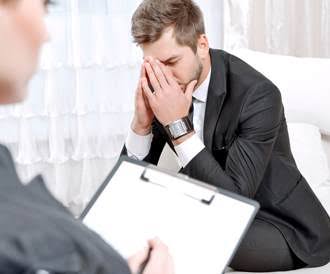Many people use the term depression when feeling any psychological problem, such as stress, anxiety, fear or frustration, which has led some to believe that depression is not a mental illness at all.
Depression: It is not a weakness or something easy to get rid of, and is defined as acute depressive disorder or clinical clinical depression
It is a disease that affects the soul and the body. Depression affects the way we think and act, and it can lead to many emotional and physical problems.
Usually, people with depression are not able to continue their daily life as usual, as depression causes them to feel a lack of any desire in life.
It should be noted that depression is one of the most common diseases in the world.
How to deal with depression?
Most health professionals treat depression as a chronic disease that requires long-term treatment, just as diabetes or hypertension is treated.
Some people with depression experience only one period of depression, but in the majority of patients, symptoms of depression recur and last for life.
Through proper diagnosis and treatment, symptoms of depression can be reduced, even if the symptoms of depression are severe.
The right treatment can improve the feeling of people with depression, usually within a few weeks, and enable them to return to the normal life they used to enjoy before they had depression.

What are the causes and risk factors for depression?
It is not known yet the exact cause of depression.
The prevailing belief, as is the case with other mental illnesses, is that many biochemical (biological - chemical), genetic and environmental factors can be the cause of depression, including:
Biochemical factors: Research that uses imaging with modern and sophisticated techniques confirms the occurrence of physical (physical) changes in the brains of people with depression. It is not known exactly what these changes are and the degree of their importance.
Genetic factors: Some research indicates that the onset of depression is more prevalent in people who have biological relatives with depression. Researchers are still trying to uncover genes involved in causing depression.
Environmental factors: The environment is, to a certain degree, a cause of depression. Environmental factors are situations and circumstances in life that are difficult to confront and coexist with, such as the loss of a dear person, economic problems and acute tension.

What are the symptoms of depression?
Symptoms of depression are different and varied because depression appears in different forms in different people.
For example, symptoms of depression may appear in a 25-year-old person with depression that differs from those that appear in a 70-year-old person.
Some people with depression may have symptoms that are so severe that something is not right.
Others may feel that they are "poor" in general, or that they are "not happy," without knowing a reason for this.
Among these symptoms:
1) Loss of desire to engage in normal daily activities
3) Feeling nervous and depressed
4) A sense of hopelessness
5) Spells of crying without any apparent reason
6) Sleep disturbances
7) Difficulty concentrating
8) Difficulty making decisions
9) Unintentionally increasing or decreasing weight
Nervous
10) Anxiety and boredom
11) Excessive sensitivity
12) A feeling of fatigue or weakness
13) A sense of worthlessness
14) Loss of desire for sex
15) Suicidal thoughts or suicide attempts
16) Unexplained physical problems, such as back or head pain.
Depression complications
Depression is a severe and stressful illness that can be a heavy burden on individuals and families.
Untreated depression may worsen to the point of disability, indigence, dependence, and even suicide. Depression can lead to severe emotional, behavioral, health, and even judicial and economic problems that affect all different areas of life.
Depression risks
1) Suicide
2) Addiction to alcohol
3) Addiction to drugs
4) Anxiety
5) Heart disease and other diseases
6) Problems at work or with education
7) Confrontations within the family
8) Difficulties in the marital relationship
9) Social isolation
Diagnosis of depression
During regular therapy meetings, doctors and therapists ask questions about moods and thoughts. Sometimes, a patient is asked to fill out a questionnaire that helps them detect symptoms of depression.
When doctors suspect that a patient has depression, they conduct a series of medical and psychological examinations.
These examinations help to refute the possibility of other diseases that may be the cause of the symptoms, and help diagnose and detect other complications related to the condition.

Tests to diagnose depression
1) Physical (physical) examination
2) Laboratory tests
3) Psychological evaluation
Criteria for diagnosing depression
An evaluation by a doctor or psychotherapist helps determine whether the condition is severe depression or another illness reminiscent of severe depression.
Treat depression
1) Drug treatment: Dozens of drugs are available on the market for treating depression. Most people can reduce symptoms of depression by combining medication and psychotherapy.
2) Psychotherapy: Sometimes psychotherapy is used in parallel with drug therapy and in conjunction with it. Psychotherapy is a comprehensive name for treating depression through conversations with a therapist about the situation and matters relating to it.
Psychotherapy is also called conversation therapy, counseling, or psychosocial therapy
3) Electroconvulsive therapy (electroconvulsive therapy): An electric current is passed through the brain to cause emotions to flood.
There are also methods for treating depression that did not meet research and experimentation, such as the accepted methods mentioned above, including:
1) Cerebral stimulation
2) Complementary and alternative therapies.
There are certain cases in which a family doctor can treat depression by himself, but in other cases, there is a need to seek the help of a qualified psychotherapist to treat depression (psychiatrist, psychologist or social worker)
It is very important for the patient to have an effective role in treating depression. Through cooperation and joint work, the doctor (or therapist) can decide, together with the patient, which type of depression treatment is best and most appropriate for the patient's condition.

If there is a difference between sadness and depression lies in the fact that grief usually includes a topic and a cause, such as losing a job or losing a loved one, then a person in a state of mourning by nature processes the feelings and memories of the lost within his human mind, but depression rarely has a clear cause.
Depression, as a type of mental disorder, involves a low mood for a long time, and other symptoms as well, such as: thoughts, feelings, behavior, and the whole body. Depression can be treated efficiently once it is recognized.










